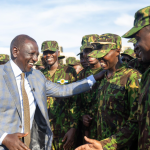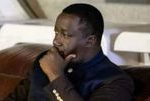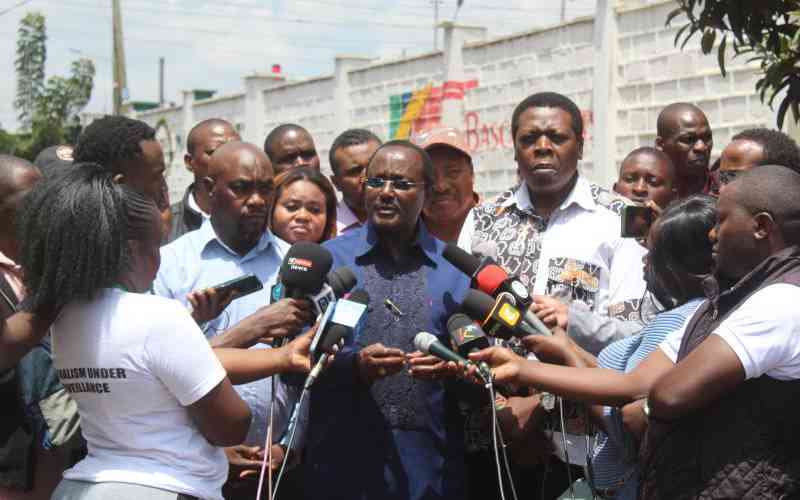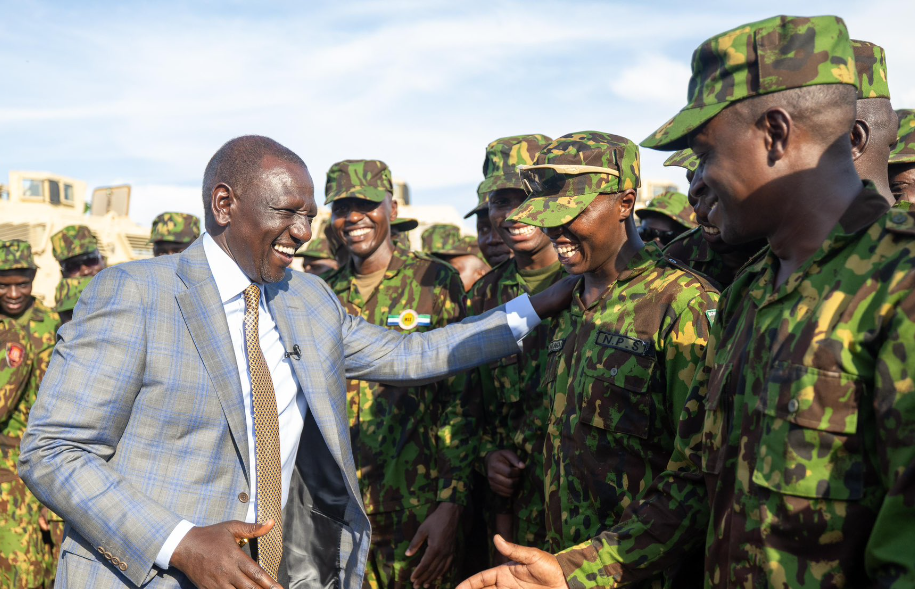Wiper Democratic Party Leader Kalonzo Musyoka flanked by Kitui Senator Enoch Wambua(Left)and DAP-K leader Eugene Wamalwa(right) during a media briefing in Nairobi Funeral Home(formerly City Mortuary)on February 1,2025 on abductions and killings of the youth.[Benard Orwongo,Standard]
It begins with whispers as families of missing persons gather at the Nairobi Funeral Home after unsuccessful search for their missing kin.
In unlucky scenarios, many families still fail to get their loved ones at the facility still commonly known by its former name, the City Mortuary.
In instances where a body is found, more people including activists and politicians join families in solidarity, making the mortuary the unlikely epicenter of activism and the fight for truth.
It is a meeting ground for loved ones who can no longer wait for the State to act.
The mortuary is usually the dumping ground for those unlucky to die in the hands of city criminals and the police.
It is where hospitals take bodies of dead patients whose relatives cannot be found.
Others are victims of road accidents and other tragedies such as collapsed buildings and flooding.
But now, as abductions and killings increase, the morgue has become a site for rallying cries, political condemnation and the quest for justice.
It is here where the dead are demanding to be heard, not through the silence of their bodies but through the stories of those left behind, desperate to uncover the truth.
The families and activists know too well that without the dead being acknowledged, without their stories being told, the cycle of violence would continue.
As the bodies of the victims are recovered and transferred to the mortuary for postmortem, this somber institution has unwittingly evolved from a place of grief and finality to a site of political and social mobilisation.
And in a world where injustice often goes unnoticed until it affects the powerful, the political implications of these mysterious deaths and discovery of bodies at the mortuary have become clearer.
On Friday, Public Service Cabinet Secretary Justin Muturi joined several families whose relatives are missing or were abducted and killed and their bodies dumped at the morgue.
Stay informed. Subscribe to our newsletter
For the second time, CS Muturi hit out at the government, putting his boss President William Ruto in a spot over the spate of abductions and killings of young people for criticising the Kenya Kwanza administration.
Muturi called for an end to the tend, warning that it could lead to anarchy.
Two weeks ago, the CS recorded a statement with the police, alleging that his son Leslkie Muturi was abducted in June last year and was only released after a call by the President to the National Intelligence Service boss Noordin Haji.
Speaking at the mortuary, Muturi insisted that it was President Ruto’s responsibility to end the trend.
“We say the buck must stop somewhere. In this case, the President, head of government, and the commander-in-chief of all defence forces. Therefore Mr President, I am calling upon you now to order an end to these abductions and extra-judicial killings as you promised,” he said.
The CS was standing in solidarity with the families of two of the three youths whose bodies were found at the mortuary on Thursday after they went missing in Mlolongo, Machakos County, in December.
The body of one of the victims, Justus Mutumwa, was discovered in Ruai, Nairobi on Wednesday evening while that of Martin Mwau was found at the mortuary.
On Saturday, opposition leader Kalonzo Musyoka led a team of politicians, lawyers and activists to join the families of Steve Mbisi and Kalani Muema, who are still missing after they were abducted in Mlolongo.
Kalonzo termed the killings as “State sponsored”, calling for justice.
“These killings have been done by a known unit and if it is not known, it is the role of the State to protect Kenyans from being abducted. It is like this country is free for all, there is nobody who can defend you even when you are abducted and killed,” he said.
“On behalf of the families, the country would want to have them dead or alive. And I repeat, nobody can wish away this whole matter of killing by the State. And they want us to believe it is not them. Now, we are calling it as it is, abductions and killing by the state. State-sponsored killings.”
The CS and the politicians called for a commission of inquiry.
Muturi proposed that the commission should involve representatives from all sectors including government officials, legal fraternity, religious groups and the civil society.
“I agree with Muturi that this country needs to set up a commission of inquiry into the whole matter of this illegal, illegitimate, unfortunate abductions which have caught the attention of the entire world. And it will not be a commission to be established by William Ruto alone,” said Kalonzo.
The Law Society of Kenya hit out at the National Police Service, saying they owe Kenyans explanations.
“The day that the court issues orders demanding the presence of the men, three bodies miraculously appear and they are able to identify one. The ball is still in your court. The responsibility is with the NPS. We are asking you to tell us what is going on in this country,” said the president, Faith Odhiambo.
Inspector General of Police Douglas Kanja and Director of Criminal Investigations Mohammed Amin appeared before court and denied the whereabouts of the three men.
The recent death of three men from Kitengela who were reportedly killed in cold blood after being abducted also brought attention to the growing cases of extrajudicial killings.
Their bodies were also found at the mortuary.
The discovery of nine women bodies in the Kware area in July last year made the mortuary a focal point in the push for push action against femicide.
Leaders, including Governor Ann Waiguru of Kirinyaga, then the chairperson of the Council of Governors, and her Embu counterpart Cecily Mbarire, gathered at the morgue calling for the revival of gender desks at police stations.
The desks, they argued, could help track trends in femicide and prevent future killings by ensuring that the police respond swiftly to reports of violence against women.
Also traced to the morgue was Chris Msando, the Independent Electoral and Boundaries Commission (IEBC) IT manager who was murdered just days to the 2017 General Election.
His body, which had signs of torture, had been collected in a forest.
Msando was responsible for overseeing the electronic voting system, and his murder raised suspicions of foul play related to the elections.
In another chilling act of violence, human rights lawyer Willie Kimani, his client Josephat Mwenda, and their taxi driver Joseph Muiruri were abducted and murdered by police officers in June, 2016.
Their bodies were found in a river, and they were brought to the mortuary, where autopsies confirmed the brutality of their deaths, sparking widespread outrage and protests.










